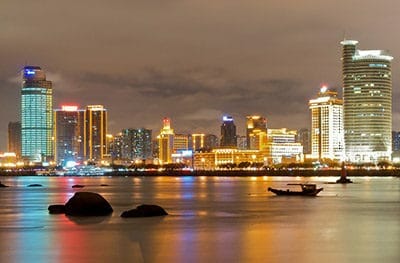
Beachfront property and rocketing housing prices have not yet been enough to sell investors on Xiamen
Real estate prices in Nanjing have risen more than 36 percent in the last year and in Xiamen the cost of a new home has shot up by over 44 percent in the same period as the Chinese government has successfully brought once frightened home buyers back into the housing market in the country’s second-tier cities.
While the chance for real estate riches has again hypnotized Chinese consumers who were once scared to buy anything outside of Shanghai, Shenzhen and other first tier cities, a recent survey by the Urban Land Institute shows that corporate and institutional property investors have not yet fallen under the same spell.
Growing By 44 Percent Does Not Make Xiamen a Favorite
In the ULI’s Chinese Mainland Real Estate Markets 2016 report, which was published last week, 81 China-based real estate professionals polled by the industry non-profit continued to rank Shanghai as having the best prospects in the country for acquiring or developing real estate assets, followed by its first-tier siblings, Shenzhen, Beijing and Guangzhou in that order.
| City | Investment 2016 | Investment 2015 | Development 2016 | Development 2016 |
|---|---|---|---|---|
| Shanghai | 4.23 | 4.09 | 4.1 | 3.84 |
| Shenzhen | 3.93 | 3.96 | 3.79 | 3.96 |
| Beijing | 3.86 | 3.85 | 3.75 | 3.52 |
| Guangzhou | 3.7 | 3.83 | 3.67 | 3.71 |
| Suzhou | 3.68 | 3.29 | 3.63 | 3.31 |
| Nanjing | 3.56 | 3.39 | 3.58 | 3.52 |
| Hangzhou | 3.55 | 3.21 | 3.45 | 3.1 |
| Wuhan | 3.45 | 3.31 | 3.41 | 3.35 |
| Xiamen | 3.26 | 3.33 | 3.41 | 3.35 |
| Zhuhai | 3.12 | 3.23 | 3.23 | 3.29 |
Suzhou, which some survey respondents described as a suburb of Shanghai, was the only second-tier city to rank in the survey’s top five cities. Guangzhou came in fourth on the list despite its home prices having grown at less than half the rate of Xiamen’s in the past year, and outranked the Fujian province commercial hub by five spots in the ULI’s rankings.
China made reviving its real estate industry a priority when property investment growth slowed to one percent in 2015, raising obstacles to the central government’s efforts to keep GDP growth in line with its target of 6.5 to 7.0 percent for 2016. With real estate accounting for at least 15 percent of the country’s total economy, the central authorities last year brought down policy barriers and increased the credit supply with an eye towards reducing a backlog of unsold homes and wooing investment-wary builders.
Investors More Cautious About Second-Tier Cities
That backlog has been deepest in the country’s smaller cities – a fact that now seems well-noted by the ULI members, who are polled every year by the organisation regarding their favored locations for development and acquisition opportunities.
“You see the consolidation of the tier one cities becoming the top ranked destinations, whereas some of the regional centres that had huge development activity until five or six years ago have been dropping in ranking,” said Ken Rhee, the ULI’s chief representative on the mainland.
Shenyang in northeastern China attracted more retail real estate investment between 2008 and 2013 than any other city, including Beijing and Shanghai. This year the capital of northeastern China’s Liaoning province came in dead last for investment prospects among 36 mainland cities ranked by the ULI members, with some survey respondents predicting that malls in the city would be forced to close down because of the oversupply of space.
“In second and third-tier cities there were many development opportunities five or six years ago, but a lot of people were overly optimistic about the market demand,” Rhee pointed out, “So there’s oversupply in these second and third-tier cities, especially for commercial properties.”
And that oversupply is not necessarily evenly distributed across the residential, retail and office sectors.
““In cities like Chengdu and Chongqing, the residential market while still not great, you don’t see a huge oversupply,” Rhee said. “But you do see a huge surplus of commercial real estate properties in both office and retail, and it will take many years for the oversupply to be resolved.”
Proximity, Rail and High Tech Drive Second-Tier Favorites
While survey respondents continued to focus on the first-tier cities, not every second-tier city is a Shenyang or a Chongqing – at least for commercial developers
The major factors driving healthy real estate markets in China’s second tier cities, according to the survey’s respondents were proximity to first-tier hubs, high speed rail links and a healthy high tech sector.
“Suzhou benefits from its location less than 25 minutes from Shanghai by high speed rail,” Rhee explained, adding that some ULI members classified the city, which ranked fifth overall among survey respondents, as a part of the Shanghai metro area.
Nanjing, which ranked sixth on the list was favored for its rapidly growing high tech sector, as well as its connection to Shanghai and Beijing via the high speed rail network. In seventh place for the ULI members was Hangzhou, which is home to China Internet giant Alibaba.
Leave a Reply